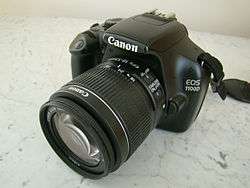Canon EOS 1100D
Canon EOS 1100D is a 12.2-megapixel digital single-lens reflex camera announced by Canon on 7 February 2011.[1] It is known as the EOS Kiss X50 in Japan and the EOS Rebel T3 in the Americas. The 1100D is Canon's most basic entry-level DSLR, and introduces movie mode to other entry level DSLRs. It replaced the 1000D and is also the only Canon EOS model currently in production that is not made in Japan but in Taiwan, aside from the EOS Rebel T4i.
 | |
| Overview | |
|---|---|
| Type | Digital single-lens reflex camera |
| Lens | |
| Lens | Canon EF lens mount, Canon EF-S lens mount |
| Sensor/medium | |
| Sensor | CMOS APS-C 22.2 × 14.7 mm (1.6x conversion factor) |
| Maximum resolution | 12.2 effective megapixels, 4,272 × 2,848 |
| ASA/ISO range | ISO 100 to 6400 |
| Storage | Secure Digital Card Secure Digital High Capacity Secure Digital Extended Capacity |
| Focusing | |
| Focus modes | AI Focus, One-Shot, AI Servo |
| Focus areas | 9 AF points |
| Exposure/metering | |
| Exposure modes | Full Auto, Portrait, Landscape, Close-up, Sports, Night Portrait, No Flash, Program AE , Shutter-priority, Aperture-priority, Manual, Auto Depth-of-field, Creative Auto |
| Exposure metering | Full aperture TTL, 63 zone iFCL SPC |
| Metering modes | Evaluative, Partial (approx. 10% at center of viewfinder), Center-weighted average |
| Flash | |
| Flash | E-TTL II automatic built-in pop-up, 13m ISO 100 guide number, 27mm (equivalent in 135 format) lens focal length coverage; compatible with Canon EX Series Speedlite external hotshoe-mount flashes |
| Flash bracketing | Yes |
| Shutter | |
| Shutter | focal-plane |
| Shutter speed range | 1/4000 to 30 s and Bulb, 1/200 s X-sync |
| Continuous shooting | 3 fps for 830 JPEG frames or 2 fps for 5 RAW frames |
| Viewfinder | |
| Viewfinder | Eye-level pentamirror SLR, 95% coverage, 0.87x magnification |
| Image processing | |
| Custom WB | Auto, Daylight, Shade, Cloudy, Tungsten Light, White Fluorescent Light, Flash, Manual, user-set |
| WB bracketing | ± 3 stops in 1-stop increments; |
| General | |
| Rear LCD monitor | 2.7 in color TFT LCD, 230,000 pixels |
| Battery | LP-E10 Battery Pack |
| Dimensions | 130 mm × 100 mm × 78 mm (5.11 in × 3.93 in × 3.07 in) |
| Weight | 495 g (1.091 lb) (body only) |
| Made in | Taiwan |
Canon announced in February 2014 that the 1100D was replaced by the 1200D/Rebel T5.[2]
Features
- 12.2 effective megapixel APS-C CMOS sensor.
- DIGIC IV Image Processor.
- 2.7-inch in color TFT LCD monitor with 230,000-dot resolution.
- Sensor Crop Factor: 1.6x
- Sensor Size : APS-C 22.2x14.7mm
- Longer battery life: 700 shots
- Less startup delay: 100 ms
- Slightly lower noise at high ISO: 755 ISO
- Continuous Drive up to 3 frames per second for 830 JPEG frames or 2 frames per second for 5 RAW frames.
- ISO sensitivity 100–6,400.
- Canon EF/EF-S lenses.
- sRGB and Adobe RGB colour spaces
- SD, SDHC, and SDXC memory card file storage
- File formats include: JPEG, RAW (14-bit CR2).
- 720p HD video at 25 or 30 fps
- Unlike many other Canon DSLRs the EOS 1100D model comes in three different body colors other than black: red, grey and brown.[3] As of 2017 the only other Canon DSLR cameras which offer additional colors are EOS 100D and EOS 300D which are available in white.
Dials
Creative Zone
- A-DEP (Auto Depth-of-field AE): The camera automatically selects the aperture and shutter speed to keep most of the image in focus. (Only recommended in high light conditions as the camera tends to choose smaller f/stops)
- M (Manual): The camera lets you choose manually the aperture and shutter speed.
- Av (Aperture priority): The camera lets the user choose the aperture (f/) value and then automatically adjusts the shutter speed for correct exposure.
- Tv (Shutter speed priority): The camera lets the user set the shutter speed and automatically sets the aperture for correct exposure.
- P (Program AE): The camera automatically chooses an aperture and shutter combination for correct exposure and the user can change between one of these combinations.
Basic Zone
- Full Auto (represented with a green rectangle): Completely automatic shooting.
- Creative Auto: is a camera setting that's designed to aid new users in achieving good quality results without having to learn and understand all of the camera's functions and how exposure is set.
- No Flash: All automatic with no flash.
- Portrait: The camera attempts to create a more shallow depth of field to create more striking portraits.
- Landscape: For shooting landscapes and sunsets.
- Close-Up: For shooting small objects near to the camera.
- Sports: For capturing fast moving objects.
- Night Portrait: Shoots with flash and with slow shutter so that the subject is illuminated by the flash and the background (e.g. a city) is also captured naturally in the night.
Video recording
The 1100D captures 720p video, it does not have continuous auto-focus while filming video; to keep a moving subject in focus the user must either trigger the auto-focus, as when shooting stills, or manually adjust the focus while recording.
References
- "Canon Rebel T3 / EOS 1100D announced and previewed". Digital Photography Review. 7 February 2011. Retrieved 7 February 2011.
- Gottfried, Horst. "Canon EOS 1200D vorgestellt: Einsteiger-DSLR mit Hilfe-App - PC Magazin". pc-magazin (in German). Retrieved 16 March 2020.
- "Techcrunch: Canon's T3 Gets A Tiny Bit More Colorful".
External links

- Canon EOS 1100D Product Page at Canon USA
- Canon Rebel T3 / EOS 1100D Hands-on Preview – dpreview.com